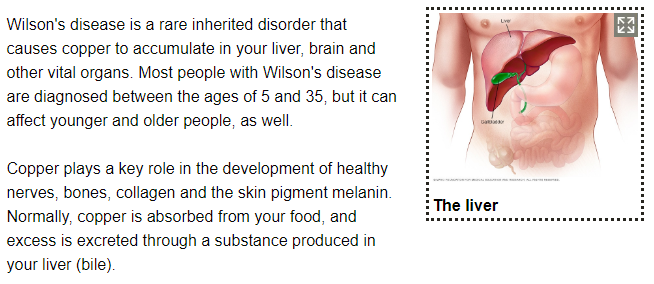
10 Proven Ways for Wilson Disease Treatment Success
Introduction
Wilson disease is an inherited, autosomal recessive disorder of copper metabolism, which is caused by a mutation in the ATP7B gene. This disorder affects 1 to 15 in every 100,000 people, and leads to an inability to use/remove copper from the body correctly. It can lead to a wide range of physical and mental health issues, including organ damage and behavioral problems. The aim of this comprehensive guide is to provide a better understanding of Wilson disease, its causes, diagnosis and treatment options.
What is Wilson Disease?
Wilson disease is a genetic disorder that affects copper metabolism. It is usually inherited as an autosomal recessive trait, meaning that both parents must carry the gene. The presence of the genetic mutation causes an inability to use or remove copper from the body in the correct manner, leading to a build-up of copper in the body, which can cause tissue and organ damage, including the liver and kidneys. Additionally, symptoms can be varied and may include behavioral problems such as depression, anxiety, and hyperactivity.
What Causes Wilson Disease?
Wilson disease is caused by a mutation in the ATP7B gene. This mutation causes the body to be unable to use or remove copper from the body as it should. This then leads to a build-up of copper in the body that can cause organ damage and a variety of health related issues.
Diagnosis and Symptoms of Wilson Disease
Wilson disease is typically diagnosed by a combination of clinical, genetic and biochemical tests. Common symptoms associated with Wilson disease can include:
- Jaundice
- Abdominal pain
- Hepatic cirrhosis
- Fatigue
- Dark urine
- Nausea/vomiting
- Depression
- Anxiety
- Hyperactivity
Diagnosis of Wilson disease is also based on serum copper and ceruloplasmin levels as well as genetic testing to determine the presence of the ATP7B mutation.
Treatments for Wilson Disease
The primary goal of Wilson disease treatment is to reduce the levels of copper in the body and to prevent further organ damage. Treatment typically involves a combination of pharmaceutical therapy, nutritional supplements, dietary changes, exercise and rehabilitation therapy, and mental health support.
Early Diagnosis and Intervention
Early detection plays a pivotal role in managing Wilson Disease. Medical professionals, including genetic counselors, can contribute significantly to prompt identification, allowing for timely intervention. A proactive approach in seeking medical advice can make a substantial difference in the overall treatment trajectory.
Medication Management
Understanding the medications prescribed for Wilson Disease is essential. Medications like chelating agents and zinc supplements are commonly used to regulate copper levels. Adherence to the prescribed treatment regimen is crucial for successful long-term management.
Dietary Modifications
Nutrition plays a vital role in the treatment of Wilson Disease. A well-balanced diet that limits copper intake is imperative. Foods high in copper, such as shellfish and organ meats, should be restricted, while incorporating copper-free alternatives can contribute to effective management.
Lifestyle Changes
Incorporating lifestyle changes is key to managing Wilson Disease successfully. Regular exercise has been shown to have a positive impact on overall health, including liver function. Stress management techniques, such as mindfulness and relaxation exercises, can complement medical treatment.
Regular Monitoring
Consistent medical check-ups are essential for monitoring the progress of Wilson Disease treatment. Regular blood tests and imaging studies help healthcare professionals assess the effectiveness of the chosen treatment plan and make adjustments if necessary.
Support Networks
Building a strong support system is crucial for individuals dealing with Wilson Disease. Family and friends play a vital role in providing emotional support, and joining support groups can offer a sense of community and shared experiences.
Liver Transplantation
In severe cases, liver transplantation may be considered as a treatment option. Understanding the criteria for transplantation and the associated considerations is essential for individuals with advanced Wilson Disease.
Holistic Approaches
Integrating alternative therapies, such as acupuncture or herbal supplements, can be explored in conjunction with conventional medical treatment. Mind-body practices, including yoga and meditation, contribute to overall well-being.
Mental Health Considerations
Addressing the psychological aspects of Wilson Disease is integral to holistic treatment. Patients and caregivers should be aware of the emotional challenges associated with chronic illness and seek professional support when needed.
Success Stories
Real-life success stories serve as powerful motivators for individuals facing Wilson Disease. Learning from others who have overcome challenges can instill hope and inspire a positive outlook on the treatment journey.
Challenges in Wilson Disease Treatment
Acknowledging and addressing common challenges faced by individuals with Wilson Disease is essential. From medication side effects to lifestyle adjustments, understanding these hurdles enables better coping strategies and a more informed approach to treatment.
Future Developments
Ongoing research and advancements in Wilson Disease treatment offer promising prospects for the future. Staying informed about emerging therapies and breakthroughs can empower individuals and their healthcare teams to explore new possibilities.
Health Risks Associated with Wilson Disease
Wilson disease can lead to a variety of health risks as a result of an accumulation of copper in the body. These health risks can include organ damage, seizures, mental health disorders, and even death in extreme cases. It is important to be aware of these risks and to seek medical attention if any of them are suspected.
Psychological Impact of Wilson Disease
Wilson disease can have a serious psychological impact on individuals and their families. The range of symptoms associated with Wilson disease can affect a person’s quality of life and daily activities. These symptoms can include depression, anxiety, and hyperactivity, which can lead to difficulty in maintaining relationships, completing tasks, and functioning in everyday life. It is important to seek psychological support if any of these symptoms occur.
Conclusion
Wilson disease is an inherited, autosomal recessive disorder of copper metabolism, which can lead to a wide range of physical and mental health issues. The aim of this comprehensive guide is to better understand Wilson disease, its causes, and treatment options. Treatment typically involves a combination of pharmaceutical therapy, nutritional supplements, dietary changes, exercise and rehabilitation therapy, and mental health support. It is important to seek appropriate medical care, understand the health risks associated with Wilson disease, and find support and additional resources.
FAQs
-
Is Wilson Disease curable?
- While there is no cure for Wilson Disease, effective management is possible through medication, lifestyle changes, and, in some cases, liver transplantation.
-
How often should I have medical check-ups for Wilson Disease?
- Regular monitoring is crucial, and the frequency of check-ups will be determined by your healthcare provider based on your specific needs and progress.
-
Can Wilson Disease affect mental health?
- Yes, the challenges of managing a chronic condition like Wilson Disease can impact mental health. Seeking professional support is advisable.
-
Are there alternative treatments for Wilson Disease?
- Some individuals explore alternative therapies, but these should be discussed with healthcare professionals to ensure they complement conventional treatment.
-
What lifestyle changes are recommended for Wilson Disease?
- Lifestyle changes include a copper-restricted diet, regular exercise, stress management, and avoiding substances that may exacerbate liver damage.
Was this helpful?
Please share your feedback to help us improve



